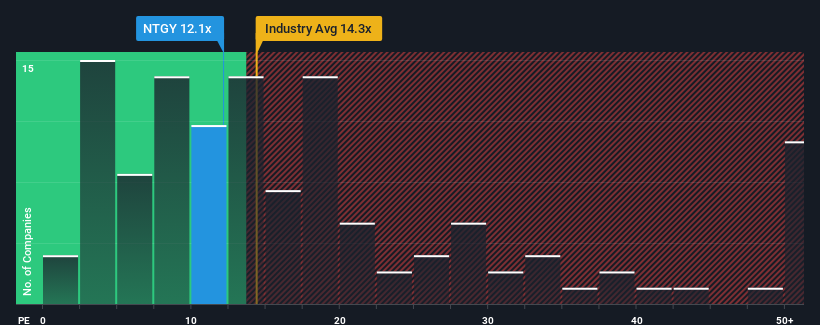- Spain
- /
- Gas Utilities
- /
- BME:NTGY
Why Investors Shouldn't Be Surprised By Naturgy Energy Group, S.A.'s (BME:NTGY) Low P/E

Naturgy Energy Group, S.A.'s (BME:NTGY) price-to-earnings (or "P/E") ratio of 12.1x might make it look like a buy right now compared to the market in Spain, where around half of the companies have P/E ratios above 16x and even P/E's above 31x are quite common. Nonetheless, we'd need to dig a little deeper to determine if there is a rational basis for the reduced P/E.
Naturgy Energy Group certainly has been doing a good job lately as it's been growing earnings more than most other companies. One possibility is that the P/E is low because investors think this strong earnings performance might be less impressive moving forward. If you like the company, you'd be hoping this isn't the case so that you could potentially pick up some stock while it's out of favour.
See our latest analysis for Naturgy Energy Group

Is There Any Growth For Naturgy Energy Group?
There's an inherent assumption that a company should underperform the market for P/E ratios like Naturgy Energy Group's to be considered reasonable.
Retrospectively, the last year delivered an exceptional 73% gain to the company's bottom line. The latest three year period has also seen an excellent 105% overall rise in EPS, aided by its short-term performance. Accordingly, shareholders would have probably welcomed those medium-term rates of earnings growth.
Looking ahead now, EPS is anticipated to slump, contracting by 10% each year during the coming three years according to the analysts following the company. With the market predicted to deliver 8.2% growth per year, that's a disappointing outcome.
In light of this, it's understandable that Naturgy Energy Group's P/E would sit below the majority of other companies. However, shrinking earnings are unlikely to lead to a stable P/E over the longer term. There's potential for the P/E to fall to even lower levels if the company doesn't improve its profitability.
The Key Takeaway
We'd say the price-to-earnings ratio's power isn't primarily as a valuation instrument but rather to gauge current investor sentiment and future expectations.
As we suspected, our examination of Naturgy Energy Group's analyst forecasts revealed that its outlook for shrinking earnings is contributing to its low P/E. Right now shareholders are accepting the low P/E as they concede future earnings probably won't provide any pleasant surprises. Unless these conditions improve, they will continue to form a barrier for the share price around these levels.
You need to take note of risks, for example - Naturgy Energy Group has 3 warning signs (and 1 which is significant) we think you should know about.
It's important to make sure you look for a great company, not just the first idea you come across. So take a peek at this free list of interesting companies with strong recent earnings growth (and a low P/E).
Valuation is complex, but we're here to simplify it.
Discover if Naturgy Energy Group might be undervalued or overvalued with our detailed analysis, featuring fair value estimates, potential risks, dividends, insider trades, and its financial condition.
Access Free AnalysisHave feedback on this article? Concerned about the content? Get in touch with us directly. Alternatively, email editorial-team (at) simplywallst.com.
This article by Simply Wall St is general in nature. We provide commentary based on historical data and analyst forecasts only using an unbiased methodology and our articles are not intended to be financial advice. It does not constitute a recommendation to buy or sell any stock, and does not take account of your objectives, or your financial situation. We aim to bring you long-term focused analysis driven by fundamental data. Note that our analysis may not factor in the latest price-sensitive company announcements or qualitative material. Simply Wall St has no position in any stocks mentioned.
About BME:NTGY
Naturgy Energy Group
Engages in the supply, liquefaction, regasification, transport, storage, distribution, and sale of natural gas.
Undervalued average dividend payer.


